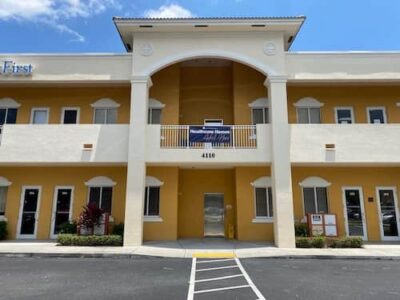Treatment Program at Recovery First Earns Optum’s Platinum Recognition
 The Partial Hospitalization Program (PHP) at Recovery First Treatment Center in South Florida was recently recognized by Optum Behavioral Health for the rehab center’s commitment and success in providing effective and efficient care.
The Partial Hospitalization Program (PHP) at Recovery First Treatment Center in South Florida was recently recognized by Optum Behavioral Health for the rehab center’s commitment and success in providing effective and efficient care.
To identify treatment programs worthy of Platinum Recognition, Optum obtains performance data to compare with regional program benchmarks and measures variations in practice patterns that may lead to poorer clinical outcomes. These program benchmarks are based on regional medians.
Metrics used in the evaluation for Platinum status include:
- The rate of unplanned readmissions to treatment at the same level of care or higher within 30 or 90 days of discharge.
- Whether follow-up appointments are kept within 7 or 30 days after discharge.
- Length of stay compared to associated benchmarks.
- Cost of treatment compared to associated benchmarks.
The data collected and analyzed by Optum found that Recovery First’s PHP met or outperformed the regional medians, earning the program the coveted Platinum Recognition.
PHP at Recovery First
Partial hospitalization—sometimes known as “day treatment”—is the most intensive form of outpatient care. At Recovery First, patients in the PHP visit the treatment center from 9:30 a.m. to 4:30 p.m. every weekday.
The PHP and other levels of addiction treatment at Recovery First utilize evidence-based approaches like:
- Cognitive-behavioral therapy (CBT). CBT is a form of therapy in which patients learn to recognize and alter negative thought and behavioral patterns.
- Motivational interviewing. This form of treatment involves patients expressing their goals and recognizing how substance use is hindering them from leading a more fulfilling life, raising their self-esteem, and shedding ambivalence in the process.
- Dialectical behavior therapy (DBT). DBT helps effect change by utilizing two seemingly opposite strategies: acceptance and change.
- Contingency management (CM). Contingency management involves small material rewards for achieving sobriety goals, such as reaching milestones or testing negative on drug screens.
- Psychoeducation. Learning about the nature of substance use disorder, its progression, pathology, and treatment is crucial to help patients and their loved one’s better manage the condition and improve recovery outcomes.
- Peer support. Whether through 12-step treatment or other programs, the support of a sober network is vital for patients during and following formal treatment.
Most of these techniques are applied in both group and individual sessions and are designed to not only help patients get sober but to remain in long-term recovery.
Get Admitted to Recovery First
 While research has identified evidence-based practices for treating substance use disorder, everyone’s individual needs are different; what works for one patient may not be effective for someone else. Upon admission to our rehab center in Hollywood, Florida, each patient will undergo an evaluation that will help determine the treatment approaches that will be utilized. Throughout treatment, the patient will speak with medical staff to determine if adjustments need to be made.
While research has identified evidence-based practices for treating substance use disorder, everyone’s individual needs are different; what works for one patient may not be effective for someone else. Upon admission to our rehab center in Hollywood, Florida, each patient will undergo an evaluation that will help determine the treatment approaches that will be utilized. Throughout treatment, the patient will speak with medical staff to determine if adjustments need to be made.
Recovery First offers multiple levels of addiction treatment, including:
Call an admissions navigator at to start the admissions process at Recovery First. Admissions navigators can guide you through using insurance to cover rehab, other payment options, and what to expect in rehab.
Verify your insurance coverage now using the confidential .
✔ Decide if treatment is right for you.
✔ See if your health insurance will pay for rehab and other available options for paying for addiction treatment.
✔ Discuss your treatment options.
✔ Check in at your treatment center.